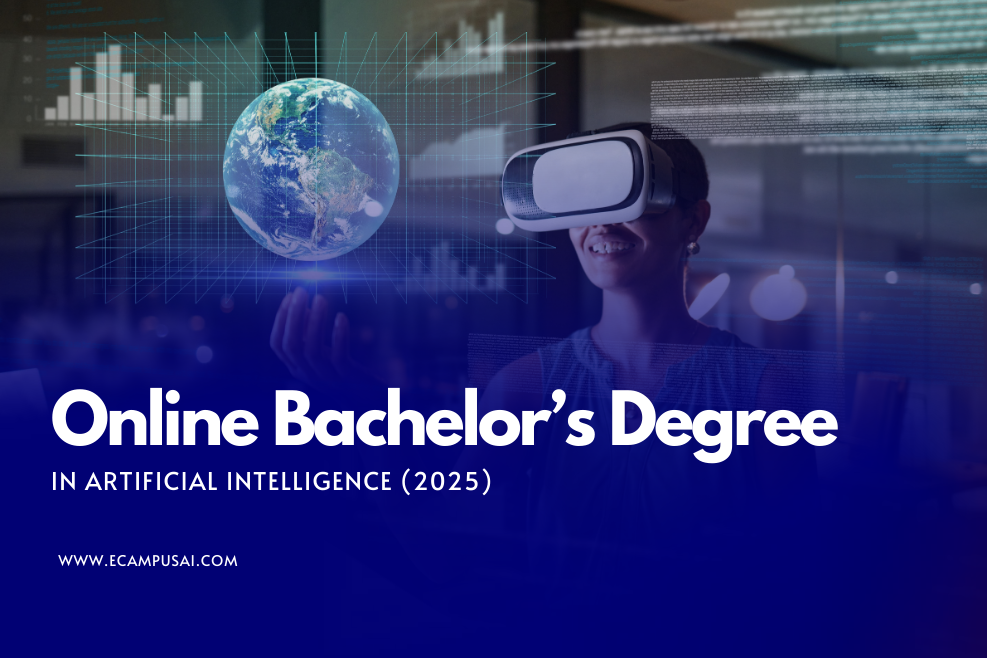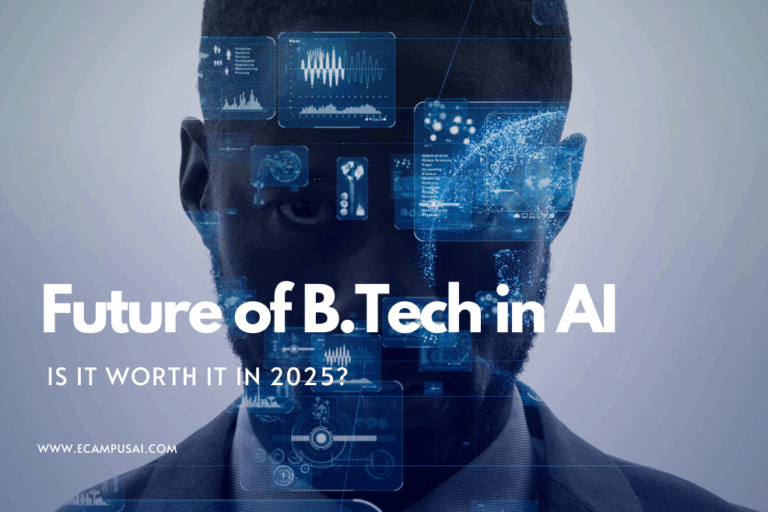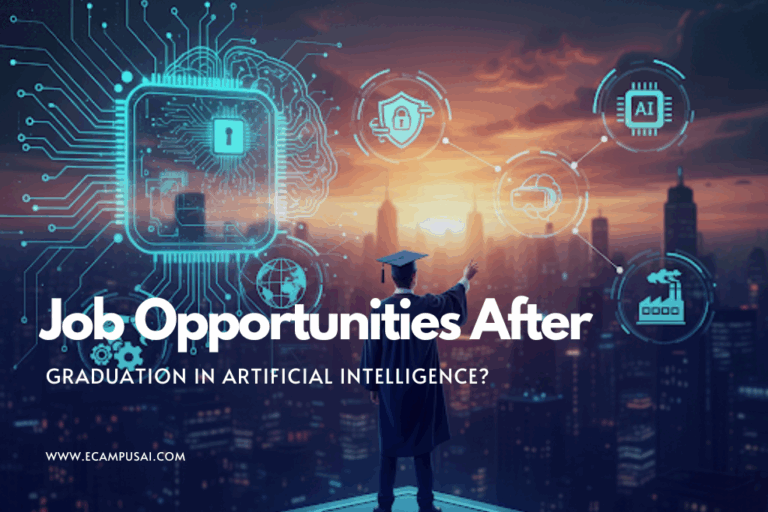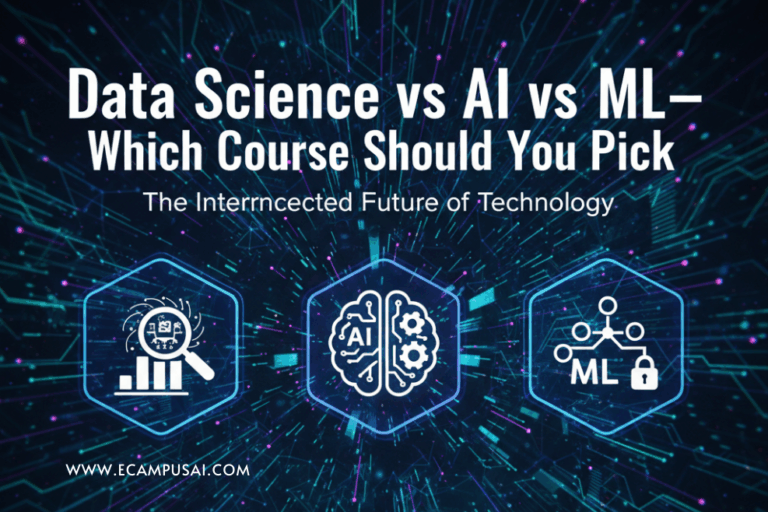Online Bachelor Degree in Artificial Intelligence (2025)
Getting an online bachelor’s degree in artificial intelligence helps people access some of the most expanding careers ahead. AI programs are changing industries by improving efficiency and allowing workers to focus on critical tasks. The United States introduced its first AI degree program in 2018, and now these programs are catching the interest of students eager to get ahead in their fields.
Finding quality education in this area requires time and digging around. Over 90 bachelor’s programs in artificial intelligence are available today, with about 20 offered online by accredited non-profit universities. Choosing the best online programs depends on how they prepare students to deal with challenges outside the classroom. Many AI degrees teach in innovative ways and link learners with the tech world, which is crucial to starting a career. To juggle personal life and studies, earning an online bachelor’s degree in artificial intelligence provides strong academics while keeping things flexible.
This guide explores why earning an AI degree could be among the smartest career moves to make by 2025. It explains what subjects you’ll study and gives advice on choosing a program that fits your career plans.
Why AI Will Shape Tomorrow’s Jobs
Workplaces change rapidly because AI units become more advanced and spread through different industries. In many areas, large rounds are experienced in how tasks are handled. These changes provide obstacles but also open the doors to get ready to start a career for everyone.
How AI is changing industries
AI is not just tweaking how companies function. It is transforming entire fields. In manufacturing, AI systems now perform jobs that people used to do. This boosts accuracy while lowering mistakes. Healthcare groups use AI to make better diagnoses and suggest treatments. This leads to better results for patients. Other areas like retail, shipping, and creative work are shifting too. AI tools now help create content and designs and even write music. Around 86% of companies recognize AI and data processing as game-changing technologies. Getting an artificial intelligence bachelor’s degree puts you ahead in this shift.
How Automation is Changing Jobs
Automation is reshaping the task marketplace by means of reducing the want for routine duties and growing the callfor skilled employees in generation management and improvement. Industries are adapting, requiring workers to learn to operate superior structures. Education is focusing on equipping the personnel with crucial skills, and while task loss is a subject; automation is predicted to create new roles, probably resulting in a net gain of 58 million jobs through 2025.
Why 2025 Marks a Shift in AI Jobs
By 2025, AI will create giant activity possibilities as organizations embody these technologies. There can be a heightened call for professionals with both technical and trouble-fixing capabilities, fostering creative and control roles beyond machines’ competencies. Continuous talent updates can be vital, prompting governments and educational institutions to prioritize retraining for AI-related positions. An AI diploma becomes increasingly more crucial as this generation integrates into normal operations.
Top Universities Offering Online Bachelor’s Degrees in AI
| University | Program | Total Fee | Mode | Location |
|---|---|---|---|---|
| CU Online (Chandigarh University) | BCA in Artificial Intelligence | ₹1,28,000 (3 years) | Online | Mohali, Punjab, India |
| Amity Online | B.Tech in AI & Data Science | ₹8.40 Lakh (4 years) | Online | Noida, Uttar Pradesh, India |
| DY Patil University | B.Tech in AI & Data Science | ₹15 Lakh (4 years) | Online | Pune, Maharashtra, India |
| Jain Online | BCA in Artificial Intelligence | ₹1.65 Lakh (3 years) | Online | Bangalore, Karnataka, India |
| Online Manipal | MCA in AI & Machine Learning | ₹2.20 Lakh (4 semesters) | Online | Manipal, Karnataka, India |
What You’ll Learn in an AI Bachelor Degree
Pursuing an online bachelor’s degree in artificial intelligence means diving into a curriculum specifically designed to bridge theoretical concepts with practical skills needed in this rapidly evolving field. The coursework offers a comprehensive blend of technical expertise and human-centered abilities that prepare students for the AI jobs of tomorrow.
Core topics: machine learning, data science, and ethics
A strong artificial intelligence degree revolves around three key areas: machine learning, data science approaches, and ethical principles. Students learn the math concepts supporting AI, such as linear algebra, calculus, and statistics. These subjects build the groundwork for understanding how systems process and learn from information. Along the way, they study supervised and unsupervised learning neural networks and natural language processing. Ethical issues in AI, including algorithm bias, data privacy, and how automation changes society, are a constant theme in the coursework.
Practical Tools: Python, TensorFlow, and Cloud Services
The top online bachelor’s programs place a strong focus on applying knowledge with real-world tools. These courses use Python as the main coding language because it works well for many tasks and is used in AI development. Students also learn to use key frameworks like TensorFlow, PyTorch, and scikit-learn to set up machine learning models. Cloud services like AWS, Google Cloud, and Azure act as test environments where students run and scale their AI projects. Instead of simply analyzing tools, students work on fingers-on projects like building facial recognition software or creating predictive analytics dashboards to showcase their skills.
Soft skills: improving critical thinking and solving problems
Even though an artificial intelligence course focuses on technology, achievements in AI often rely on human abilities. Programs teach students to analyze case studies about where AI has worked and where it has failed, helping them think. They also build communication skills by explaining difficult technical ideas in simple ways to people without technical knowledge. Teamwork on group projects helps reflect real-world job practices where teams solve problems without clear answers. These courses help students learn how to define problems first—a task that can often be the hardest part of using AI—before diving into technical fixes.
Choosing the Right AI Degree Program
Choosing the best online bachelor’s degree in artificial intelligence is about thinking about what matches your career plans and the way you like to examine things. You want to weigh what works best for you in both practical and academic methods.
Online or on-campus: which one fits the way you live
Online courses allow you to study from anywhere while juggling work and personal commitments. In contrast, traditional on-campus programs give students access to in-person labs, networking opportunities, and face-to-face interactions. Tuition costs differ a lot with public universities averaging INR 979,657 for in-state students, while private universities charge around INR 3,657,892 each year. However, online programs usually cut out extra costs like commuting and housing.
BS vs BA in AI: Which one suits you better?
A Bachelor of Science makes a specialty of technical subjects, which includes machine learning, data science, and cybersecurity. A Bachelor of Arts mixes in subjects from the humanities and arts, giving a broader view and more possibilities to take electives, add minors, or pursue double majors. Choosing among them relies upon whether or not you aim to focus on technical skills or prefer to learn across many areas.
Top features of the best online bachelor’s degree programs
Good programs include accreditation, practical courses, and hands-on work. Seek chances to gain experience through internships, final projects, or partnerships with industries to get real-world knowledge. It also helps to choose programs that let students adjust their schedules and focus on specific areas like autonomous systems, app design, or business leadership.
How to evaluate course content and faculty
Analyze the curriculum thoroughly—ensure it covers essential topics in AI fundamentals, programming, and ethics. Evidently, faculty expertise in both academic research and industry practice significantly impacts your learning experience. Accordingly, investigate whether the program offers hands-on labs, project-based learning, and access to industry-standard tools.
Career Opportunities After Graduation
Graduating with an artificial intelligence bachelor’s degree opens doors to some of today’s most lucrative and future-proof careers. The career landscape for AI professionals is expanding at an unprecedented rate, with significant opportunities awaiting skilled graduates.
Emerging roles in AI and machine learning
The AI job market is flourishing with diverse roles beyond traditional programming. AI engineers, machine learning engineers, and data scientists rank among the fastest-growing positions in 2025. Professionals with AI skills earn, on average, 25% more than peers without such expertise. Consequently, roles like prompt engineers, AI ethics officers, and human-machine teaming managers are becoming increasingly vital as organizations integrate AI into decision-making processes.
Industries hiring AI graduates in 2025
Healthcare, finance, and education sectors are investing heavily in AI technologies. First, in healthcare, AI assists in developing treatment plans and improving patient outcomes. Meanwhile, finance sectors leverage AI for portfolio management and risk assessment. Tech giants like Google, Microsoft, Amazon, and NVIDIA actively recruit AI graduates for roles spanning research, product development, and infrastructure.
How internships and capstones boost employability
Practical experience through internships validates technical skills and demonstrates your ability to contribute to end-to-end AI projects. In fact, internships showcase hands-on skills with tools like Python, TensorFlow, and OpenCV—qualities employers actively seek. Participating in AI challenges and hackathons allows working with real datasets under time constraints, potentially leading to job offers.
Graduate study and long-term career growth
Many graduates pursue advanced degrees to enhance their skill sets and earning potential. The AI career path offers impressive progression opportunities—from AI Developer to Senior Engineer to Architecture roles. Furthermore, AI specialists can evolve into domain experts, research innovators, ethics specialists, or strategic leaders depending on their interests.
Also Read: Top B.Tech Specializations for Artificial Intelligence & Data Science in 2025
Conclusion
As we approach 2025, an AI bachelor’s degree is a clever funding for your future. AI is growing more jobs than it displaces, with a net advantage of 58 million positions globally, impacting industries from healthcare to manufacturing.
When selecting an application, don’t forget your mastering fashion and career dreams. Online alternatives offer flexibility, even as campus experiences provide hands-on labs and networking. Both a BS and a BA provide precious profession possibilities, with curricula combining technical abilities and essential questioning.
Graduates can pursue roles like AI engineer, machine learning specialist, and prompt engineer, which offer higher salaries—typically 25% more than non-AI roles. Internships and capstone projects will give you a competitive edge.
AI is no longer experimental, and those with formal education will lead the way. Your degree will not only prepare you for your first job but also pave the way for long-term career growth in a dynamic field.







